This is an Eastern European-influenced Austrian Infantry Officer's Sword, Model 1837. The flamboyant iron hilt has a cylindrical scroll quillon terminal, large, broad flared P-form guard, wire-wrapped sharkskin-covered grip and an integral back strap and pommel. The 33 1/2” curved, broad fullered single-edged blade with distinct Eastern European-form clipped point is etched first half with foliage and trophies of military arms. The blade shows smooth medium gray patina throughout, etching quite crisp and the hilt shows smooth gray/ brown staining. The grip's condition is excellent.
[ Linked Image ]
Below is a French An XII Light Cavalry Sword, dated 1813. The sword has a single-edged, curved 34 inch blade, with a large central fuller. The back edge of the blade is etched, 'Manufactured Klingenthal Juin 1813'. The blade itself bears three inspection stamps, B, L and K. The sword has a brass three-bar hilt, leather-bound grip (wire binding missing) and a central tang rivet. The hilt is stamped, '238'. The sword comes complete in its original steel scabbard with two hanging rings. An interesting piece. No scabbard. Overall length: 39.5m.
[ Linked Image ]
[ Linked Image ]
[ Linked Image ]
Above is an English M1827 Rifle Brigade Officer's Sword whose use probably dates from the 1870’s. The 33" blade with inset proof shows brown patina with light pitting. The iron Gothic hilt has a bugle device strung to it and also shows smooth brown patina, never plated. The wire-wrapped sharkskin covered grip shows some worm tracks and few wires missing. This sword's iron scabbard, marked 2/CLY, lacks the throat mount. One good example for Zulu Wars period collection.
Above is an English M1827 Rifle Brigade Officer's Sword whose use probably dates from the 1870’s. The 33" blade with inset proof shows brown patina with light pitting. The iron Gothic hilt has a bugle device strung to it and also shows smooth brown patina, never plated. The wire-wrapped sharkskin covered grip shows some worm tracks and few wires missing. This sword's iron scabbard, marked 2/CLY, lacks the throat mount. One good example for Zulu Wars period collection.
Here is another one from Hermann Historica, a Dutch rapier from around 1640-1650, 118cm long.
 Attachment: 20.41 KB
Attachment: 20.41 KB
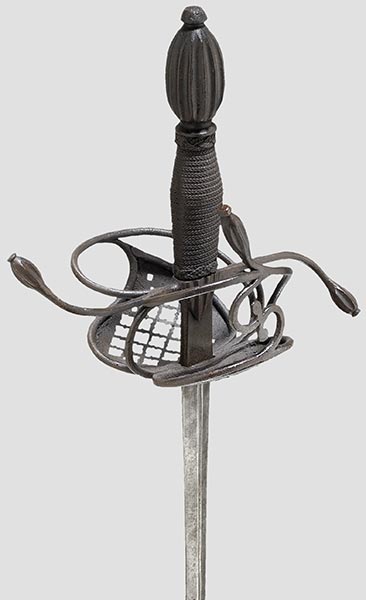

A German Felddegen, circa 1650, 99.5cm long - Hermann Historica
 Attachment: 16.42 KB
Attachment: 16.42 KB
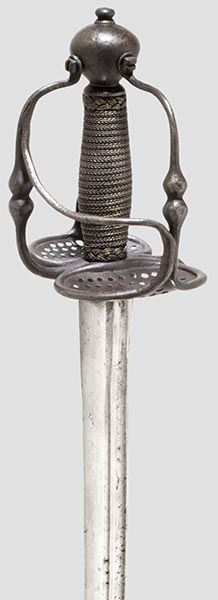
 Attachment: 6.17 KB
Attachment: 6.17 KB

 Attachment: 31.39 KB
Attachment: 31.39 KB
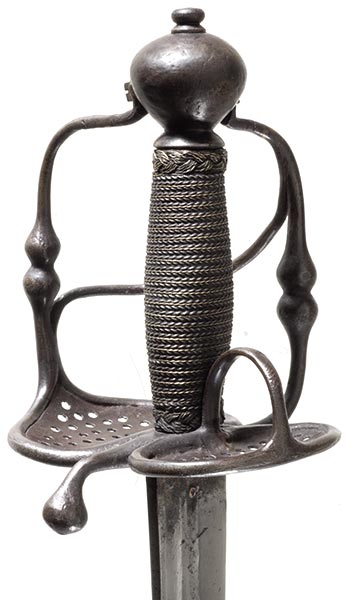



This thread isn't nearly random enough. oO
Behold!
Chounsai Koretoshi. An odachi, I think. Out of all nihonto I've seen, this one is possibly my favourite.
Kanmuri-otoshi-zukuri soshu tsunahiro. Another favorite. Probably the strangest-looking katana I've ever seen.
Sword with rock crystal wheel pommel.
The "Kaninholm Saber", a grossemesser with a katzbalger guard. (Reproduction.)
Behold!
Chounsai Koretoshi. An odachi, I think. Out of all nihonto I've seen, this one is possibly my favourite.
Kanmuri-otoshi-zukuri soshu tsunahiro. Another favorite. Probably the strangest-looking katana I've ever seen.
Sword with rock crystal wheel pommel.
The "Kaninholm Saber", a grossemesser with a katzbalger guard. (Reproduction.)
baskethilts on parade on cleaning/oiling day


A South German hand-and-half, circa 1515,110cm long
 Attachment: 5.26 KB
Attachment: 5.26 KB

 Attachment: 9.69 KB
Attachment: 9.69 KB
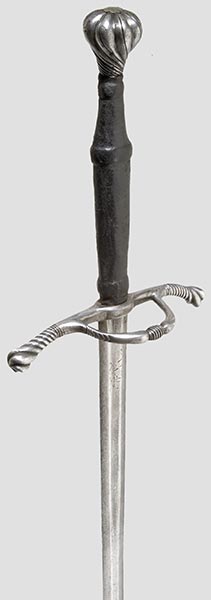


[ Linked Image ]
Above is a magnificent jewel-encrusted 19th century Ottoman or Hungarian Damascus steel sabre. The sabre has a curved Damascus blade, single-edged with a 5" false edge, and etched with trophies-of-arms, Turkish flags and Cufic inscriptions. The Mameluke-style hilt and scabbard fittings are silver-gilt with multi-colour enamels and set with turquoise and red cabochon stones (some missing). The grip is wrapped with silver wire along with an enameled lozenge on the silver-gilt pommel. The crossguard is also silver-gilt with openwork quillons. It is missing an enamel lozenge on the front and has a well-executed engraved floral design on the back. The scabbard is wood covered in blue velvet. The fittings are similar to the crossguard, with silver-gilt and enamels, set with stones and engraved reverses. The 5¼" upper mount and 7½" bottom mount are particularly beautiful and well-executed. There are two middle mounts, one a ring-mount, and the other missing a lozenge. This type of sword, very popular in Ottoman lands, was also popular many Balkan states and Eastern European countries such as Hungary. Similar examples are in the Topkapi Sarayi Museum in Istanbul, Turkey. As mentioned, some stones are missing, condition fine.
Above is a magnificent jewel-encrusted 19th century Ottoman or Hungarian Damascus steel sabre. The sabre has a curved Damascus blade, single-edged with a 5" false edge, and etched with trophies-of-arms, Turkish flags and Cufic inscriptions. The Mameluke-style hilt and scabbard fittings are silver-gilt with multi-colour enamels and set with turquoise and red cabochon stones (some missing). The grip is wrapped with silver wire along with an enameled lozenge on the silver-gilt pommel. The crossguard is also silver-gilt with openwork quillons. It is missing an enamel lozenge on the front and has a well-executed engraved floral design on the back. The scabbard is wood covered in blue velvet. The fittings are similar to the crossguard, with silver-gilt and enamels, set with stones and engraved reverses. The 5¼" upper mount and 7½" bottom mount are particularly beautiful and well-executed. There are two middle mounts, one a ring-mount, and the other missing a lozenge. This type of sword, very popular in Ottoman lands, was also popular many Balkan states and Eastern European countries such as Hungary. Similar examples are in the Topkapi Sarayi Museum in Istanbul, Turkey. As mentioned, some stones are missing, condition fine.
Last edited by Shahril Dzulkifli on Thu 21 Jan, 2010 4:53 am; edited 2 times in total
I really like the grace and elegance of the Ottoman shamshir or scimatar. From what I have read they originated in Persia and their cousin is the Talwar in India as well as the aforementioned scimatar. This is a truly beautiful sword. Nice picture. Thanks for sharing it with us.
Harry :) :) :)
Harry :) :) :)
Below is a magnificent French Cavalry Officer's Mameluke Sword from the 1st Empire with rhinoceros horn grip. The sword is 37½" overall with a 33" curved blade. The blade retains vestiges of the original engraved decoration, with some scattered light pitting and salt-and-peppering. The heavy brass-mounted Mameluke-style hilt displays langets elaborately decorated with intertwined scrolls and heavy acorn-shaped quillons. The rhinoceros horn grip with finger ridges display the Napoleonic crown over N in an oval brass escutcheon on the obverse while a similar plain escutcheon is on the reverse. The pierced circular brass disc is inserted at the pommel for the sword knot. The hilt is perfect, horn with a rich smooth patina. The all brass scabbard is elaborately scrolled and floral engraved at the throat and a 6¾" section at the bottom. The domed ring mounts are separately affixed and overlaid with separately-affixed pierced floral and scroll work. A 1½" x 2" relief-stamped brass medallion is affixed between the ring mounts displaying the eagle of the "Imperial Standard." The scabbard is in very fine condition with just a few scattered minor dents on the lower portion.
[ Linked Image ]
[ Linked Image ]
Here is a viking-type sword that was offered for sale by a German arms dealer in 2007. It is no longer on his internet site so I assume it was sold. The dealer claims to have various titles for expertise in historical arms and that all his pieces are genuine. I can't help but wonder though - in my several years of collecting and tracking viking-type swords at auctions and in museum collections I have not come across one with such inlays on the blade. Perhaps one or two illustrations of some (much lesser) blade inlays. If this is a truly genuine sword it seems some nordic museums would have fought over owning it! Any thougts?
 Attachment: 195.66 KB
Attachment: 195.66 KB
[ Download ]
[ Download ]
Antique American Civil War sword:
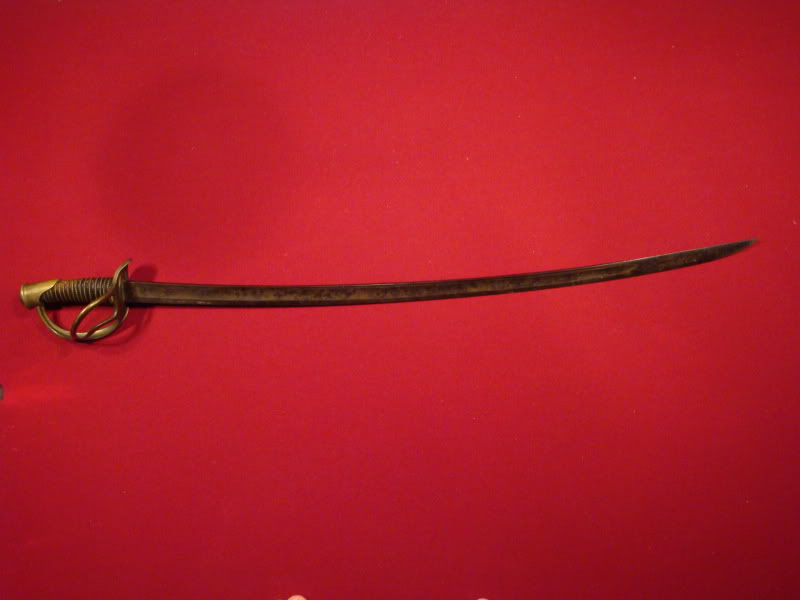

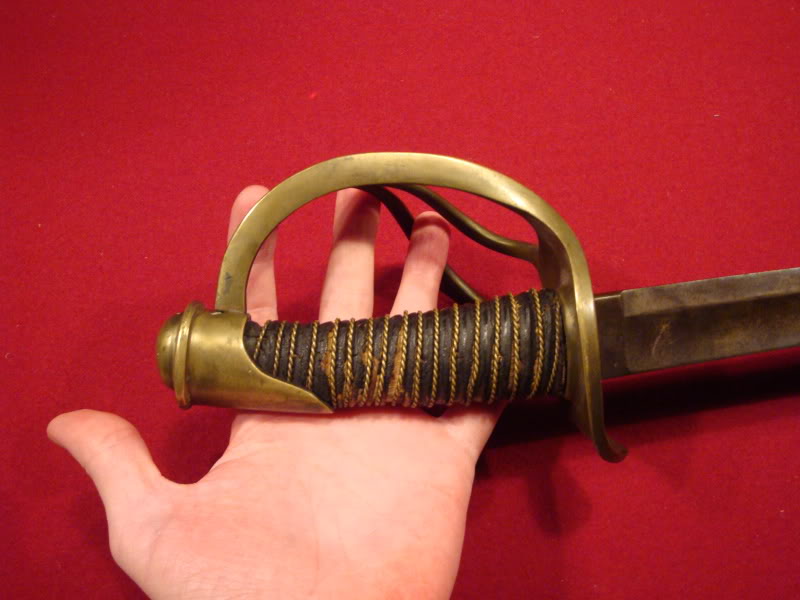



Just to keep the randomness going...
This is Chinese Qing Dynasty Emperor Qianlong's "Kuoming Dao", which has an obvious Indian Influence. Some people believe this came to be after Qianlong became extremely impressed with a Saber (shown below) given to him by Lord Macartney, Ambassador to China at the time (possibly 1793).
QIanlong (25th Sept 1711 - 7th Feb 1799) had a number of Dao (single edged swords) made with similar Indian design influence, the main adopted feature being the hilts, in the case of the "Kuoming Dao" being entirely made of white jade. The "Kuoming Dao" is of the "Yanmao", or "Goose Quill" blade design type. This type is significant in that a great number of Jian (2 edged sword) techniques are possible, while retaining a great deal of the Dao's cutting ability. A military Saber of the Ming and early Qing Dynasties, the "Yanmao Dao" was replaced in this role on account of being too difficult and time-consuming to master the use of.
In fact, Qianlong had a huge number of beautiful swords, of all types, made throughout his reign, as he was the longest reigning Emperor in Chinese History. He was also an extraordinary Martial Artist, apparently capable of defeating his own Imperial Bodyguards. They are certainly worth looking up if interested. I mean the swords, not the bodyguards...
I hope it's random enough. :D
 Attachment: 24.18 KB
Attachment: 24.18 KB
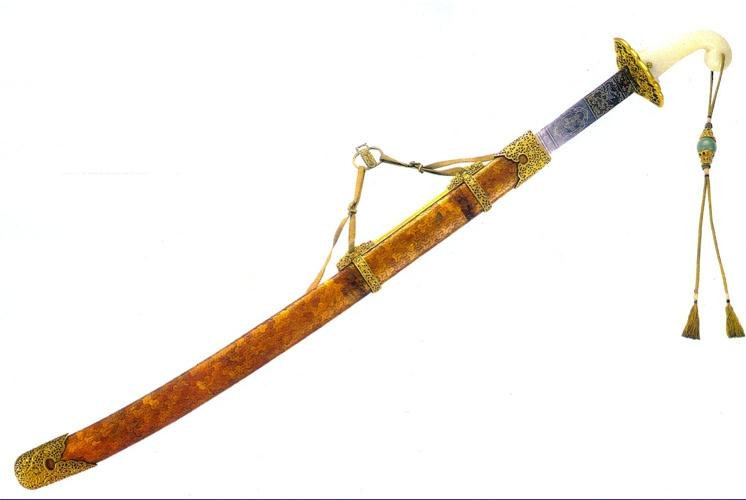
The Kuoming Dao. Thanks to Thomas Chen for the picture.
 Attachment: 38.37 KB
Attachment: 38.37 KB
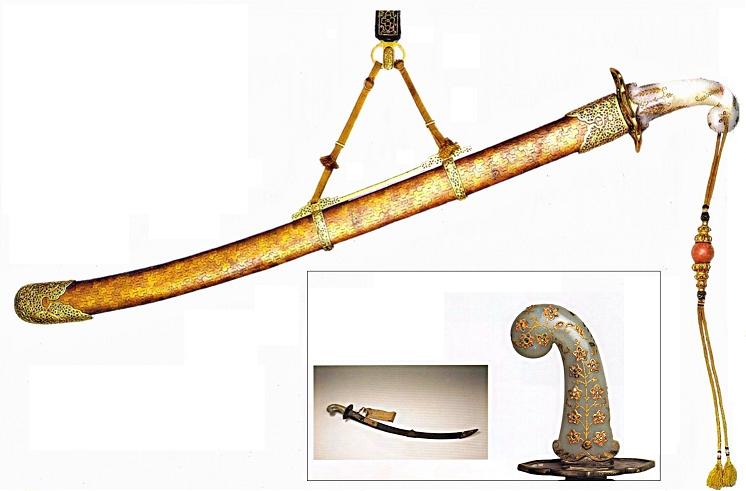
(Top) Kuoming's sister sword. (Inset) The saber gifted by Lord Macartney. Thanks to Thomas Chen for the pictures.
This is Chinese Qing Dynasty Emperor Qianlong's "Kuoming Dao", which has an obvious Indian Influence. Some people believe this came to be after Qianlong became extremely impressed with a Saber (shown below) given to him by Lord Macartney, Ambassador to China at the time (possibly 1793).
QIanlong (25th Sept 1711 - 7th Feb 1799) had a number of Dao (single edged swords) made with similar Indian design influence, the main adopted feature being the hilts, in the case of the "Kuoming Dao" being entirely made of white jade. The "Kuoming Dao" is of the "Yanmao", or "Goose Quill" blade design type. This type is significant in that a great number of Jian (2 edged sword) techniques are possible, while retaining a great deal of the Dao's cutting ability. A military Saber of the Ming and early Qing Dynasties, the "Yanmao Dao" was replaced in this role on account of being too difficult and time-consuming to master the use of.
In fact, Qianlong had a huge number of beautiful swords, of all types, made throughout his reign, as he was the longest reigning Emperor in Chinese History. He was also an extraordinary Martial Artist, apparently capable of defeating his own Imperial Bodyguards. They are certainly worth looking up if interested. I mean the swords, not the bodyguards...
I hope it's random enough. :D

The Kuoming Dao. Thanks to Thomas Chen for the picture.

(Top) Kuoming's sister sword. (Inset) The saber gifted by Lord Macartney. Thanks to Thomas Chen for the pictures.
[ Linked Image ]
Above is a rare French Hussar Officer's Sabre around 1790's. The fantastic Damascus blade is curved, with "Klingenthal" etched on its edge. The way it was etched also points to the sword's pre-1800 production. There are also engravings on the blade with some inspection marks on one side and a decoration on the reverse. Blade length: 31 1/4". Width: 1 1/2". The knuckle hilt is made out of brass and bears inspection marks as well as the maker's marks while the leather-covered wooden handle is currently worn.
Above is a rare French Hussar Officer's Sabre around 1790's. The fantastic Damascus blade is curved, with "Klingenthal" etched on its edge. The way it was etched also points to the sword's pre-1800 production. There are also engravings on the blade with some inspection marks on one side and a decoration on the reverse. Blade length: 31 1/4". Width: 1 1/2". The knuckle hilt is made out of brass and bears inspection marks as well as the maker's marks while the leather-covered wooden handle is currently worn.
Here is a European Infantry Hanger circa 1790-1815. The 30" curved broad fullered single-edged blade with short ricasso, completely unmarked, shows crusty medium rusting. One piece brass hilt with ribbed grip, straight cross guard, stirrup form guard and plain backstrap developing to deeply modeled lion head pommel. It shows surface wear, dark patina and good uniform aging. Classic Napoleonic example. No scabbard.
[ Linked Image ]
[ Linked Image ]
[ Linked Image ]
Above is an Infantry Officer's Sword of either Swedish or Norwegian origin dating around 1860-70. The gilt hilt has an integral backstrap and lion head pommel in excellent condition, with nearly all the original gold remaining. The broad knuckle bow has a raised rococo foliage decoration and high relief arms of Sweden over a crowned C cipher of Charles XV (1859-1872). Its wire-wrapped, leather-covered grip had some minor flakes only. The 34 1/4” double-fullered blade is beautifully-etched and gilt with arms, stars and motto while the iron scabbard had 95% original blackened finish, but evidently stuck in the tip as the blade fails to enter by 3/8”. Its near mint blade had some very tiny black speckles toward the point and a fine example from the period of united Sweden and Norway under Charles XV's rule.
Above is an Infantry Officer's Sword of either Swedish or Norwegian origin dating around 1860-70. The gilt hilt has an integral backstrap and lion head pommel in excellent condition, with nearly all the original gold remaining. The broad knuckle bow has a raised rococo foliage decoration and high relief arms of Sweden over a crowned C cipher of Charles XV (1859-1872). Its wire-wrapped, leather-covered grip had some minor flakes only. The 34 1/4” double-fullered blade is beautifully-etched and gilt with arms, stars and motto while the iron scabbard had 95% original blackened finish, but evidently stuck in the tip as the blade fails to enter by 3/8”. Its near mint blade had some very tiny black speckles toward the point and a fine example from the period of united Sweden and Norway under Charles XV's rule.
Here is a good example of a German-made Swiss Regulation Sword which dates from the early 20th century. It is mounted with a double fullered blade that measures 31 3/4 inches in length which remains in very nice condition with only some minor surface staining. The fishskin-wrapped hilt also remains very healthy, reflecting just a little good honest wear, with the original twisted wire wrap still tightly in place. The wonderful half-basket hilt is beautifully accentuated with lovely pierced work which is nicely detailed with engraving. The metal scabbard has a couple of working dings near the drag but does remain in very good, serviceable condition. Overall measuring 39 inches in length.
[ Linked Image ]
[ Linked Image ]
[ Linked Image ]
Above is a M1817 Imperial Russian Infantry Hanger with one piece ribbed grip hilt (fine patina with heavy wear including to the “backstrap") as typically encountered for these - evidently the result of specified polishing for dress. The knucklebow shows two ordnance marks and clear 1826 issue date while the 26 3/4” curved single-edged blade has a single tiny nick and smooth light gray patina.
Above is a M1817 Imperial Russian Infantry Hanger with one piece ribbed grip hilt (fine patina with heavy wear including to the “backstrap") as typically encountered for these - evidently the result of specified polishing for dress. The knucklebow shows two ordnance marks and clear 1826 issue date while the 26 3/4” curved single-edged blade has a single tiny nick and smooth light gray patina.
wow, Shahril, i`m really impressed.
Are these all pieces of your collection ?
(and please, don`t let this thread sleep away)
Are these all pieces of your collection ?
(and please, don`t let this thread sleep away)
Page 2 of 3
You cannot post new topics in this forumYou cannot reply to topics in this forum
You cannot edit your posts in this forum
You cannot delete your posts in this forum
You cannot vote in polls in this forum
You cannot attach files in this forum
You can download files in this forum
All contents © Copyright 2003-2006 myArmoury.com — All rights reserved
Discussion forums powered by phpBB © The phpBB Group
Switch to the Full-featured Version of the forum
Discussion forums powered by phpBB © The phpBB Group
Switch to the Full-featured Version of the forum